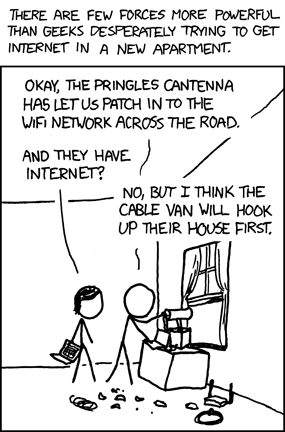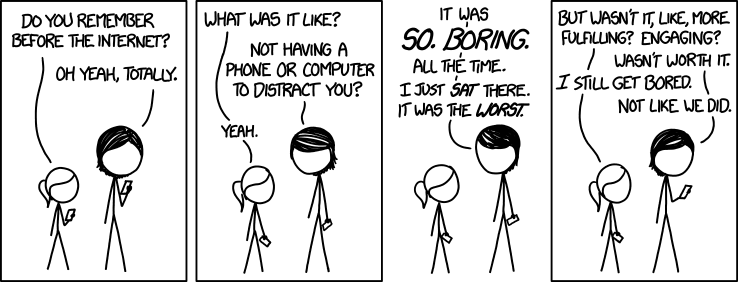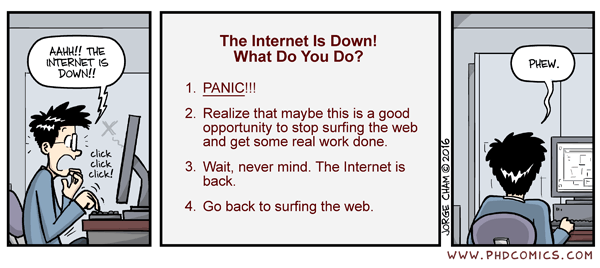I moved to the UK to begin a postdoc with John Cremona at the University of Warwick. And for the last four weeks, I have had no internet at my home. This wasn't by choice — it's due to the reluctance of my local gigantitelecom to press a button that says "begin internet service." I could write more about that, but that's not the purpose of this note.
The purpose of this note is to describe the large effects of having no internet at my home for the last four weeks. I'm at my home about half the time, leading to the title.

I have become accustomed to having the internet at all times. I now see that many various habits of mine involved the internet. In the mornings and evenings, I would check HackerNews, longform, and reddit for interesting reads. Invariably there are more interesting seeming things than I would read, and my Checkout bookmarks list is a hundreds-of-items long growing list of maybe interesting stuff. In the middle times throughout the day, I would checkout a few of these bookmarks.
All in all, I would spend an enormous amount of time reading random interesting tidbits, even though much of this time was spread out in the "in-betweens" in my day.

When I didn't have internet at my home, I had to fill all those "in-between" moments, as well as my waking and sleeping moments, with something else. Faced with the necessity of doing something, I filled most of these moments with reading books. Made out of paper. (The same sort of books whose sales are rising compared to ebooks, contrary to most predictions a few years ago).
I'd forgotten how much I enjoyed reading a book in large chunks, in very few sittings. I usually have an ebook on my phone that I read during commutes, and perhaps most of my idle reading over the last several years has been in 20 page increments. The key phrase here is "idle reading". I now set aside time to "actively read", in perhaps 100 page increments. Reading enables a "flow state" very similar to the sensation I get when mathing continuously, or programming continuously, for a long period of time. I not only read more, but I enjoy what I'm reading more.
As a youth, I would read all the time. Fun fact: at one time, I'd read almost every book in the Star Wars expanded universe. There were over a hundred, and they were all canon (before Disney paved over the universe to make room). I learned to love reading by reading science fiction, and the first novel I remember reading was a copy of Andre Norton's "The Beastmaster" (... which is great. A part telepath part Navajo soldier moves to another planet. Then it's a space western. What's not to love?).

My primary source of books is the library at the University of Warwick. Whether through differences in continental taste or simply a case of different focus, the University Library doesn't have many books in its fiction collection that I've been intending to read. I realize now that most of the nonfiction I read originates on the internet, while much of the fiction I read comes from books. Now, encouraged by a lack of alternatives, I picked up many more and varied nonfiction books than I would otherwise have.
As an unexpected side effect, I found that I would also carefully download some of the articles I identified as "interesting" a bit before I headed home from the office. Without internet, I read far more of my checkout bookmarks than I did with internet. Weird. Correspondingly, I found that I would spend a bit more time cutting down the false-positive rate — I used to bookmark almost anything that I thought might be interesting, but which I wasn't going to read right then. Now I culled the wheat from the chaff, as harvesting wheat takes time. (Perhaps this is something I should do more often. I recognize that there are services or newsletters that promise to identify great materials, but somehow none of them have worked better to my tastes than hackernews or longform. But these both have questionable signal to noise.).
The result is that I've goofed off reading probably about the same amount of time, but in fewer topics and at greater depth in each. It's easy to jump from 10 page article to 10 page article online; when the medium is books, things come in larger chunks.
I feel more productive reading a book, even though I don't actually attribute much to the difference. There may be something to the act of reading contiguously and continuously for long periods of time, though. This correlated with an overall increase my "chunking" of tasks across continuous blocks of time, instead of loosely multitasking. I think this is for the better.
I now have internet at my flat. Some habits will slide back, but there are other new habits that I will keep. I'll keep my bedroom computer-free. In the evening, this means I read books before I sleep. In the morning, this means I must leave and go to the other room before I waste any time on online whatevers. Both of these are good. And I'll try to continue to chunk time.
To end, I'll note what I read in the last month, along with a few notes about each.
Fiction
From best to worse.
- The best fiction I read was The Three Body Problem, by Cixin Liu. I'd heard lots about this book. It's Chinese scifi, and much of the story takes place against the backdrop of the Chinese cultural revolution... which I know embarassingly little about. The moral and philosophical underpinnings of this book are interesting and atypical (to me). At its core are various groups of people who have lost faith in aspects of science, or humanity, or both. I was unprepared for the many (hundreds?) of pages of philosophizing in the book, but I understood why it was there. This aspect reminded me of the last half of Anathem by Stephenson (perhaps the best book I've read in the last few years), which also had many (also hundreds?) of pages of philosophizing. I love this book, I recommend it. And I note that I read it in four sittings. There are two more books completing a trilogy, and I will read them once I can get my hands on them. [No library within 50 miles of me has them. I did buy the first one, though. Perhaps I'll buy the other two.]
- The second best was The Lathe of Heaven by Ursula Le Guin. This is some classic fantasy, and is pretty mindbending. I think the feel of many books of Ursula Le Guin is very similar — there are many interesting ideas throughout the book, but the book deliberately loses coherence as the flow and fury of the plot reaches a climax. I like The Lathe of Heaven more than The Wizard of Earthsea and about the same as The Left Hand of Darkness, also by Le Guin. I read this book in three sittings.
- I read three of the Witcher books, by Andzej Sapkowski. Namely, The Sword of Destiny, Blood of Elves, and Time of Concempt. These are fun, not particularly deep reads. There is a taste of moral ambiguity that I like as it's different from what I normally find. On the other hand, Sapkowski often uses humor or ambiguity in place of a meaningful, coherent plot. The Sword of Destiny is a collection of short tales, and I think his short tales are better than his novels — entirely because one doesn't need or expect coherence from short stories.
I'm currently reading Confusion by Neal Stephenson, book two of the Baroque trilogy. Right now, I am exactly 1 page in.
Nonfiction
I rank these from those I most enjoyed to those I least enjoyed.
- How Equal Temperament Ruined Harmony, by Duffin. This was told to me as an introduction to music theory [in fact, I noted this from a comment thread on hackernews somewhere], but really it is a treatise on the history of tuning and temparaments. It turns out that modern equal termperament suffers from many flaws that aren't commonly taught. When I got back to the office after reading this book, I spent a good amount of time on youtube listening to songs in mean tone tuning and just intonation. There is a difference! I read this book in 2 sittings — it's short, pretty simple, and generally nice. However there are several long passages that are simply better to skip. Nonetheless I learned a lot.
- A Random Walk down Wall Street, by Burton Malkiel. I didn't know too much about investing before reading this book. I wouldn't actually say that I know too much after reading it either, but the book is about investing. I was warned that reading this book would make me think that the only way to really invest is to purchase index funds. And indeed, that is the overwhelming (and explicit) takeawar from the book. But I found the book surprisingly readable, and read it very quickly. I find that some of the analysis is biased towards long-term investing even as a basis of comparison.
- Guesstimation, by Weinstein. Ok, perhaps it is not fair to say that one "reads" this book. It consists of many Fermi-style questions (how many golf balls does it take to fill up a football stadium type questions), followed by their analysis. So I read a question and then sit down and do my own analysis. And then I compare it against Weinstein's. I was stunned at how often the analyses were tremendously similar and got essentially the same order of magnitude at the end. [But not always, that's for sure. There are also lots of things that I estimate very, very poorly]. There's a small subgenre of "popular mathematics for the reader who is willing to take out a pencil and paper" (which can't have a big readership, but which I thoroughly enjoy), and this is a good book within that subgenre. I'm currently working through its sequel.
- Natures Numbers, by Ian Stewart. This is a pop math book. Ian Stewart is an emeritus professor at my university, so it seemed appropriate to read something of his. This is a surprisingly fast read (I read it in a single sitting). Stewart is known for writing approachable popular math accounts, and this fits.
- The Structure of Scientific Revolutions, by Thomas Kuhn. This is metascience. I read the first half of this book/essay very quickly, and I struggled through its second half. This came highly recommended to me, but I found the signal to noise ratio to be pretty low. It might be that I wasn't very willing to navigate the careful treading around equivocation throughout. However, I think many of the ideas are good. I don't know if someone has written a 30 page summary, but I think this may be possible — and a good alternative to the book/essay itself.
I'm now reading Grit, by Angela Duckworth. Another side effect of reading more is that I find myself reading one fiction, one non-fiction, and one "simple" book at the same time.
Written while on a bus without internet to Heathrow, minus the pictures (which were added at Heathrow).
Info on how to comment
To make a comment, please send an email using the button below. Your email address won't be shared (unless you include it in the body of your comment). If you don't want your real name to be used next to your comment, please specify the name you would like to use. If you want your name to link to a particular url, include that as well.
bold, italics, and plain text are allowed in comments. A reasonable subset of markdown is supported, including lists, links, and fenced code blocks. In addition, math can be formatted using
$(inline math)$or$$(your display equation)$$.Please use plaintext email when commenting. See Plaintext Email and Comments on this site for more. Note also that comments are expected to be open, considerate, and respectful.